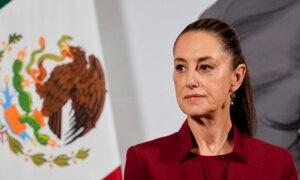The decision was made after a phone call with European Commission President Ursula von der Leyen.
WASHINGTON—President Donald Trump announced Sunday that the United States will delay the implementation of a 50 percent tariff on European Union products to July 9 from June 1.
The decision was made after a phone call with European Commission President Ursula von der Leyen earlier in the day.
“I agreed to the extension—July 9, 2025—It was my privilege to do so. The Commission President said that talks will begin rapidly.”
“The EU and US share the world’s most consequential and close trade relationship. Europe is ready to advance talks swiftly and decisively. To reach a good deal, we would need the time until July 9,” she wrote.
Trump initially said on May 23 that the United States will impose a 50 percent tariff on the European Union starting June 1. He also expressed frustration about the trade negotiations with the EU.
“I’m not looking for a deal. I mean, we’ve set the deal. It’s at 50 percent,” Trump later told reporters in the Oval Office.
“I’ve been saying to everybody they’ve been treating us very badly over the years,” Trump continued. “[The EU] was formed in order to hurt the United States, in order to take advantage of the United States, and they’ve done that.”
Treasury Secretary Scott Bessent in an interview on Fox News on May 23 said that he hoped that the impending tariff will “light a fire under the EU” to negotiate with Washington.
“The EU has a collective action problem here. It’s 27 countries but they’re being represented by this one group in Brussels,” Bessent said.
He added that he expects to announce more deals with other trading partners who are negotiating in good faith.
Trade Barriers
The United States and EU share the largest bilateral economic relationship in the world. Yet, U.S. goods and services face persistent tariff and non-tariff barriers in the EU market, according to the latest Foreign Trade Barriers report issued by U.S. Trade Representative (USTR).
Many processed foods such as confectionary products and baked goods also face complex and burdensome tariffs under the EU’s Meursing Table system, which calculates duties based on product composition.
Under this system, the EU charges a tariff on each imported good based on the products’ content of milk fat, milk protein, starch, and sugar. This system not only increases administrative burden but also creates uncertainty for U.S. food exporters, according to the USTR.
In addition, the EU does not administer its laws through a single customs administration, which presents another layer of complexity for U.S. exporters. Each EU member state enforces customs law independently, resulting in different interpretations and enforcement throughout the bloc.
The EU’s technical barriers to trade also remain a sticking point. For example, Europe’s adoption of regional standards for safety, quality, environmental protection, labeling, and packaging impede market access for U.S. products even if they meet international standards, according to the USTR.
Jack Phillips contributed to this report.
Original News Source Link – Epoch Times
Running For Office? Conservative Campaign Consulting – Election Day Strategies!


